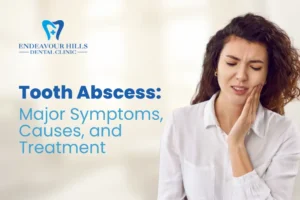Tooth Abscess: Major Symptoms, Causes, and Treatment

A tooth abscess is a painful condition that can lead to serious health complications if left untreated. Understanding its symptoms, causes, and available treatments is essential for maintaining good oral health. This article will delve into the details of tooth abscesses, including their types, causes, symptoms, and treatment options.
What is a Tooth Abscess?
A tooth abscess is a pocket of pus that forms in or around the tooth due to a bacterial infection. This infection can occur in different parts of the tooth, leading to different types of abscesses. The pus consists of dead tissue, bacteria, and white blood cells, which accumulate as the body attempts to fight the infection.
Abscesses are often the result of untreated cavities, periodontal (gum) disease, or a cracked tooth that allows bacteria to enter the tooth or surrounding gums.
Tooth Abscess Types
1. Periapical Abscess:
This type forms at the tip of the tooth’s root and is usually caused by an untreated dental cavity or trauma to the tooth that allows bacteria to infiltrate the pulp.
2. Periodontal Abscess:
This occurs in the gums at the side of a tooth root and is often the result of gum disease or an injury to the gums.
3. Gingival Abscess:
This abscess forms in the gum tissue without affecting the tooth or periodontal ligament. It is typically caused by a foreign object, like a popcorn hull, becoming lodged in the gums.
5 Major Causes of Abscessed Tooth
Understanding the causes of a tooth abscess can help in preventing this painful condition. The major causes include:
1. Poor Dental Hygiene:
Inadequate brushing and flossing can lead to tooth decay and gum disease, which can cause abscesses.
2. High Sugar Diet:
Consuming foods and drinks high in sugar can promote dental cavities, which may lead to abscess formation.
3. Gum Disease:
Periodontal disease can lead to the gums receding from the teeth, forming pockets that are susceptible to infection.
4. Tooth Injury:
Cracks or chips in the teeth can allow bacteria to enter the tooth and cause an abscess.
5. Previous Dental Work:
Poorly done dental procedures can leave openings for bacteria to cause an infection.
Symptoms that You have Abscessed Tooth
Recognizing the symptoms of a tooth abscess is crucial for seeking timely treatment. Common symptoms include:
1. Severe Toothache:
Persistent, throbbing pain that may extend to the jawbone, neck, or ear.
2. Sensitivity to Hot and Cold:
Increased sensitivity to temperature changes in food and beverages.
3. Swelling:
Swollen face or cheek can indicate an abscess.
4. Fever:
An infection can cause a rise in body temperature.
5. Bad Taste in Mouth:
A sudden rush of foul-tasting and smelling fluid in your mouth can indicate an abscess has burst.
6. Swollen Lymph Nodes:
Swelling in the lymph nodes under your jaw or in your neck.
Why You Should Visit Your Dentist?
A tooth abscess should not be ignored as it can lead to serious complications, including:
Spread of Infection:
The infection can spread to the jaw, neck, or other areas, potentially leading to sepsis, a life-threatening condition.
Bone Loss:
Chronic infection can lead to bone loss in the jaw.
Tooth Loss:
Severe abscesses can damage the tooth to the point where it cannot be saved and must be extracted.
Visiting your dentist at the first sign of an abscess can prevent these complications and provide relief from pain.
Treatment Options
Treatment for a tooth abscess aims to eliminate the infection, save the tooth if possible, and prevent complications. Common treatments include:
1. Drainage:
The dentist will make a small incision in the abscess to drain the pus, relieving pain and pressure.
2. Root Canal:
This procedure involves removing the infected pulp, cleaning and disinfecting the root canals, and then filling and sealing the space.
3. Antibiotics:
In cases where the infection has spread or is severe, antibiotics may be prescribed to help eliminate the bacteria.
4. Tooth Extraction:
If the tooth cannot be saved, it may need to be extracted to prevent the spread of infection.
5. Pain Management:
Over-the-counter pain relievers can help manage the pain until you can see a dentist.
FAQs
Q: Can a tooth abscess heal on its own?
A: No, a tooth abscess requires professional treatment. While the pain might temporarily subside if the abscess ruptures, the infection remains and can spread.
Q: How can I prevent a tooth abscess?
A: Maintain good oral hygiene, limit sugary foods, use fluoride toothpaste, and visit your dentist regularly for check-ups and cleanings.
Q: Is a tooth abscess an emergency?
A: Yes, a tooth abscess is classified as a dental emergency. Timely treatment is crucial to avoid further complications.
Conclusion
Tooth abscesses are painful infections that require immediate dental attention. Understanding the types, causes, symptoms, and treatment options can help you manage and prevent this condition. Regular dental visits and good oral hygiene are key to maintaining healthy teeth and gums. If you suspect you have a tooth abscess, contact your dentist promptly to avoid serious health issues.
If you are experiencing symptoms of a tooth abscess and are near Endeavour Hills, don’t hesitate to visit the Endeavour Hills Dental Clinic. The team of experienced professionals provides comprehensive care to address dental infections and other oral health issues promptly. At Endeavour Hills Dental Clinic, patients can expect compassionate care, advanced treatment options, and a commitment to restoring dental health. Ensure peace of mind and relief from pain by scheduling an appointment with them today.
